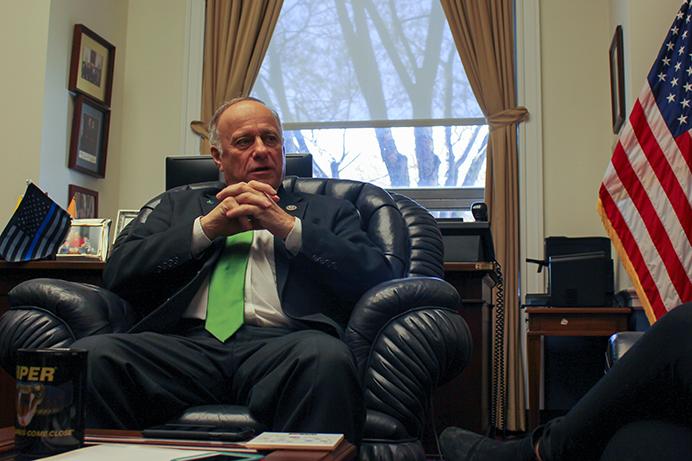By Isabella Rosario
In the 1970s, both my parents’ families immigrated to the United States from the Philippines. At a Halloween party years later, my 1980s-permed mom mustered the courage to approach my dad in his Coke-bottle glasses and asked coyly, “Don’t you go to the University of Iowa, too?” They soon began dating, and a few years after they got married, they had me and my younger brother.
I would argue to Rep. Steve King, R-Iowa, that the two of us are doing a mighty fine job keeping the American Dream alive as “somebody else’s babies.”
On March 12, King expressed support for Islamophobic, far-right Dutch leader Geert Wilders in a tweet that stated, “Wilders understands that culture and demographics are our destiny. We can’t restore our civilization with somebody else’s babies.” He was swiftly met with backlash not only from the general public but also his own party. Iowa GOP Chairman Jeff Kauffman stated he disagreed with King’s comments, citing diversity as “the strength of any nation and any community.” Gov. Terry Branstad deemed them “totally inappropriate.” Lt. Gov. Kim Reynolds said his words don’t reflect Iowa values.
King is no stranger to ethnic controversy. As recently as July 2016, he came under fire for implying Western people are the only group who have significantly contributed to society. In 2013, he claimed many undocumented immigrant children from Mexico have “calves the size of cantaloupes because they’re hauling 75 pounds of marijuana across the desert.” And as early as 2006, King compared undocumented immigrants to cattle when he suggested an electrified fence be built along the southern border: “We do that with livestock all the time.”
And yet, after over a decade of repeatedly condemning his hateful rhetoric, Republican Party leaders continue to support King’s bids for re-election. And every two years, his district keeps voting him in.
As the daughter of immigrant parents and a strong proponent of the importance of diversity, I was naturally upset by King’s comments. However, living in today’s political climate, hearing this sort of rhetoric doesn’t shock me anymore. In 2008, King’s predictions that an Obama presidency would incite celebrations from radical Islamists could be easily dismissed as the fringe beliefs of an extremist. But now, when President Trump calls undocumented Mexican immigrants “rapists,” his bald racist remarks don’t drive away crowds booing, they bring people to their feet.
Sure, Republicans still denounce King’s racism, as they do with Trump’s — just never enough to stop supporting them. They generate a dichotomy of call-out culture and complacency — speaking one way and voting another. It’s why King doesn’t have to worry about what he tweets, even if reports reveal it causes outraged Americans to cancel vacations to his state.
But this isn’t just about far-right politicians feeling more empowered to publicly display their prejudice.
Well, actually, it’s about exactly that. Because this sort of rhetoric doesn’t stay contained in capitol buildings — it plays a large part in emboldening people to act on their previously internalized hatred in violent and devastating ways. Last fall, the FBI released data revealing that hate crimes against Muslims in 2016 had reached the highest levels since 2001. This year, within weeks of each other, a Sikh man from Washington state and two Indian men from Kansas were shot by men who told them to get out of the country. Furthermore, the Jewish community has faced numerous bomb threats in recent weeks against their community centers. And on, and on, and on.
The fact is, words matter. Words spoken, written, tweeted by politicians, matter. Government leaders need to act in a way that mirrors their words when calling out their colleagues’ prejudice.
Hatred is not an American value.



